Our gauges and meters are precision instruments for quantitative non-destructive testing, inspection and measurement of coating and surface characteristics.
Our coating thickness gauges and gloss meters are used in a variety of settings for a range of purposes, with a user base ranging from industrial businesses to automotive professionals to enthusiasts. Being digital electronic gauges our coating thickness gauges are more accurate and feature packed than older style mechanical pull-off gauges that could only read on steel. While our coating thickness gauges measure depths of a variety of coatings on metal substrates, the most common application is measurement of thickness of applied paint. Hence the commonly used, but more narrow, term “paint thickness gauge” or more generically “paint gauge”.
Likewise, while our gloss meters can measure surface lustre of a variety of materials, a common application is measurement of reflectivity of paint (both automotive and non-automotive).
Whilst the range of applications and industries in which our gauges can be used is broad, some common applications of where and why a coating thickness gauge or gloss meter is used are highlighted below. If you have a query on suitability for your intended application, please contact us.
Manufacturing and Fabrication
Manufacturing businesses often have several reasons for wishing to measure coating thicknesses. As highlighted above, our coating thickness gauges measure thicknesses of paint but also of other coatings and are suitable for metal refinishers that undertake anodising or plating. From a product control perspective businesses needs can be in respect of quality control, as described below. From a cost management perspective, businesses can wish to check a coating is not being applied more thickly than necessary. This can become particularly important with expensive coatings and volume production. Additionally, for proper functioning or aesthetics it may be necessary for a coating to be applied consistently and within a specified thickness range. Businesses can also have a need to keep records of coating thicknesses applied for the purposes of production record keeping or material usage auditing and evaluation.
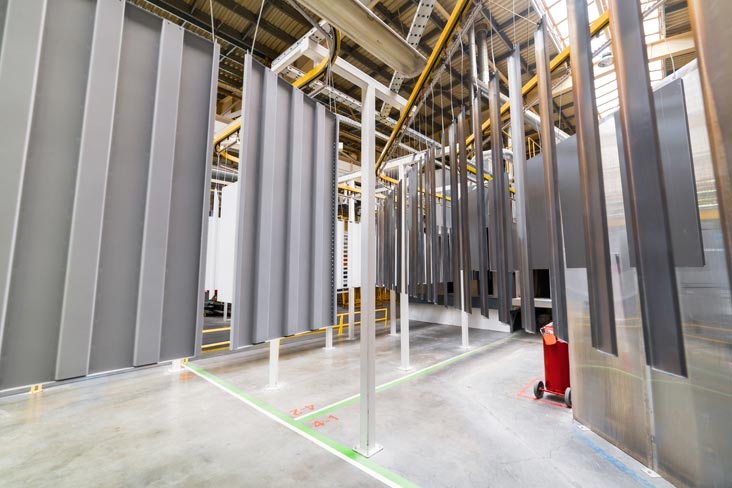
Quality Control
Bodyshops, powder coaters and painters often use paint thickness gauges to check thickness of paint applied. Typically this can be for quality control purposes to ensure a coating has been applied consistently and within prescribed ranges. This can be important to ensure sufficient coverage of the substrate metal has been achieved, that the coating performs as expected and has the desired aesthetics. Automatic statistic calculation (of maximum, minimum and average readings), as featured on our FN Evo and FN CM coating thickness gauges, can assist in the inspection process and save time.
Metal purchasers and inspectors use coating thickness gauges to assess whether coatings (such as those for protective purposes) have been applied within prescribed limits or assess whether they consistent and sufficient for their purpose (such as corrosion protection). Often these users will have the need to keep a record of readings and our 156 USB gauge offers the ability to download readings to a PC at a later time.
Surface gloss is an important characteristic affecting aesthetics and visual appearance of a product or item. For this reason, measurement and consistency of surface gloss is important when managing visual appearance. Where a product is composed of several components, consistent gloss as well as colour is important to provide a uniform visual appearance. The smoothness and quality of a surface finish will also affect its reflectivity and a gloss meter can be used to check a finish is within prescribed lustre parameters and check consistency between items or production batches.
Vehicle Inspection
Buyers of vehicles use paint thickness gauges to check paintwork on a vehicle prior to purchase. While used cars can have hidden histories of accident damage, bodywork or paintwork, new cars may have had touch-ups due to dings during transport, storage or test drives. Often this can be difficult to identify by simply looking, particularly in poor lighting conditions or if a vehicle is not clean and if the repair is of high quality.
A paint thickness gauge will allow the coating thickness on the bodywork to be electronically measured around the car with precision. Importantly, any body filler applied will also be measured as part of the coating. Areas on the car where the paint is shown to be notably thicker than others can be cause for further investigation as it could indicate a resprayed area or one with body filler underneath. Likewise, significant variations in paint thickness within a panel could indicate a localised “SMART” repair has been carried out. An area of significantly thinner paint, that could indicate a risk of future lacquer (clearcoat) failure that could require a respray, could indicate that an area has been aggressively polished – perhaps to remove scratches.
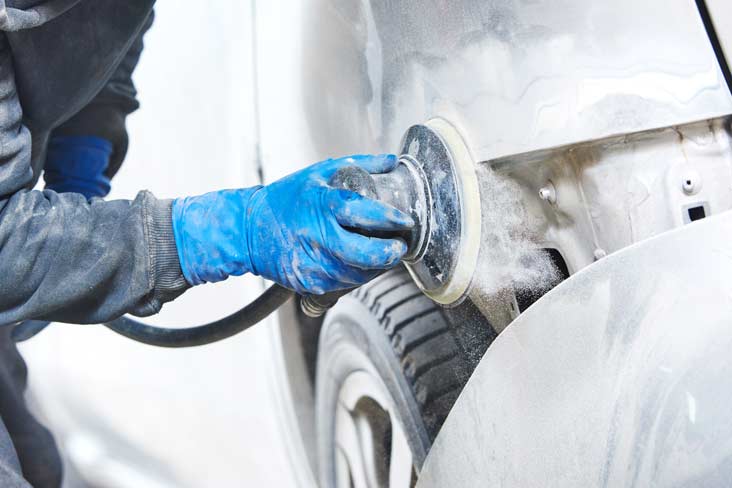
Experienced professional buyers at car dealers and buyers at vehicle auctions have long been aware of the advantages checking bodywork with a paint depth gauge. Professional vehicle inspectors and appraisers regularly use paint thickness gauges as part of providing a comprehensive report on its condition. Increasingly though, individual buyers who may be less experienced in spotting signs of previous repairs are becoming aware of the benefits (where the cost of a gauge can far outweigh the potential financial loss from buying a vehicle with a hidden accident history).
Overall, a paint gauge can not only help avoid expensive purchase mistakes or provide a basis for price negotiations but also speed the vehicle inspection process. Speedy inspection is particularly important at vehicle auctions, where there are a large number of cars and time for inspection is limited.
Detailing
Detailers use paint thickness gauges and gloss meters to inspect and evaluate paint on cars and other vehicles. Measurements of paint thickness and gloss can be taken both prior to and after engaging in any work on a vehicle, to obtain a quantitative measurement of its effect.
Of particular importance is taking of paint thickness readings prior to, during and after wet sanding or machine polishing a vehicle’s paint. This can be important to judge viability for material removal vis-a-vis the risk of strike through, coating failure and the need for an expensive respray. For this application a gauge with sufficient resolution (1µm) and high consistency of reading is important, in order to adequately gauge speed and level of material removal. With those detailers who do not require the ability to download readings to a PC, our FN Pro and FN Evo gauges are popular choices.
Gloss meters are useful to provide a quantitative measurement of surface lustre prior to and after any detailing and product application. This provides a quantitative measurement beyond a subjective visual qualitative inspection.
Restoration and cleaning
In order to assess results of restoraiton and cleaning work, quantitative measurements can be taken with non-destructive test equipment. If a coating, such as paint, has been applied then it’s thickness and uniformity can be checked by both the contractor and the client with a coating thickness gauge. This can be verified versus any contracted specifications.
In terms of aesthetics, a gloss meter can be used to quantitatively take a measurement of the appearance of a surface. Sometimes the desired gloss level can be stipulated in contracted terms. In other cases, for example, in marble and stonework cleaning and polishing the contractor can record and communicate to the customer the improvement in gloss level achieved by their work.
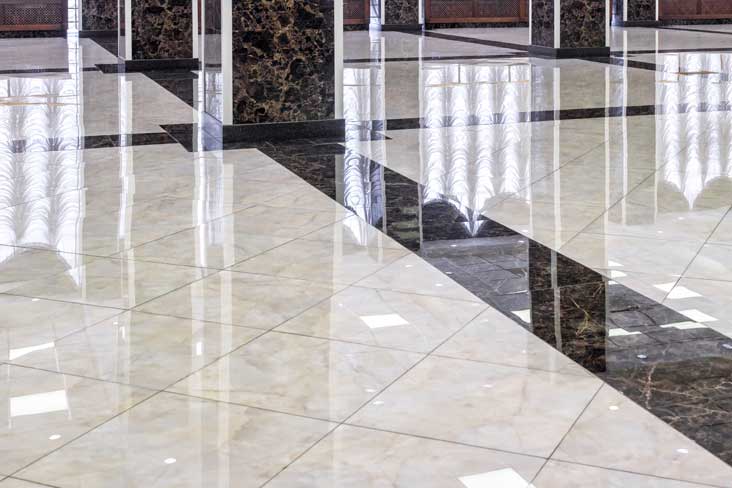
These are just some uses of our gauges and their application is not limited to these fields
More broadly, our coating thickness gauges can be used in situations it is necessary to measure a dry coating thickness on a metallic substrate (please review the technical specifications on each gauge’s detail pages). Our gloss meters can be used in situations where it is necessary to measure reflectivity of a surface and on a wide range of materials beyond paint – such as plastic, wood, stone or printing ink for example.
-
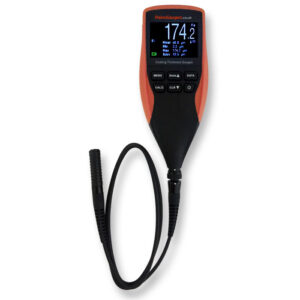 FN Ext Coating Thickness Gauge£299.99
FN Ext Coating Thickness Gauge£299.99 -
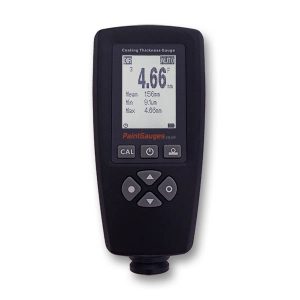 FN Max Coating Thickness Gauge£329.99
FN Max Coating Thickness Gauge£329.99 -
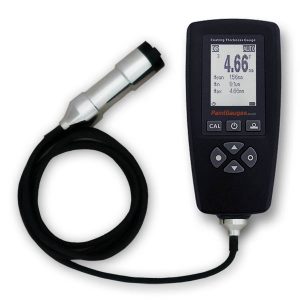 FN Max Ext Coating Thickness Gauge£379.99
FN Max Ext Coating Thickness Gauge£379.99
